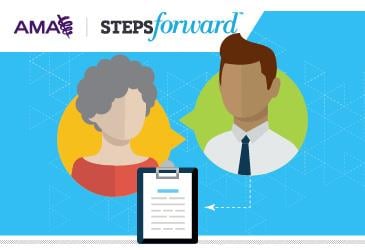Well-trained medical assistants (MA) can hold fast the front line of patient care, freeing up physicians from some of their routine administrative and clinical tasks. MAs can play an integral role in achieving practice goals, but sometimes inconsistencies in training and expectations can slow down the progression toward physician-led team-based care. Find out how one practice implemented a professional training program to ensure all of their MAs were able to provide high-quality care support.
Giving the MAs in your practice consistent and accurate professional development tools can help incre
ase their knowledge and ability to contribute to the practice team in a meaningful way. The AMA’s STEPS Forward™ collection of practice improvement strategies can help your practice further the training of MAs in a way that suits both the needs of the practice and the MAs—resulting in better care for your patients and a more efficient work day for you.
Finding the source of the problem
Vanguard Medical Group in New Jersey, which contributed this STEPS Forward module after winning the AMA-MGMA Practice Innovation Challenge, was in the process of implementing a physician-led team-based care model in 2012 when the practice collected revealing feedback from physicians, patients, clinical and administrative staff and care coordinators. Their feedback indicated that, among MA staff, there were varied levels of performance, making the implementation of the new work flows more difficult and time consuming.
Vanguard found that the variation in MA performance was in large part a result of three things:
- Differences in prior education and experience
- Lack of opportunity for MAs to access professional development beyond the initial new-hire orientation process
- Non-formalized communication with MAs about performance expectations beyond the annual review
As a result of these obstacles, physicians had to complete administrative tasks left unaddressed or repeat clinical tasks done incorrectly. The MAs felt undervalued and thought that the practice was not invested in supporting their professional growth. Meanwhile, some patients commented that MAs were inconsistent in terms of professionalism, phone skills, accurately relaying information and the rooming process.
Vanguard determined that because MA performance was uneven, this essential component of the practice staff was left untapped and underdeveloped. The need for MA training was clear and prompted the implementation of a professional development program.
The solution
Using topics selected through a staff survey, the nurse care coordinators lead the initiative at each site. These leaders deliver a monthly MA training session in a modular format. Modules are delivered each month in a “lunch and learn” format and are approximately 45 minutes long. They may include warm-up exercises, short electronic surveys, interactive presentations, handout materials, guest speakers and peer instruction.
The professional development cycle begins with the distribution of pocket-sized flashcards (available for download as tools in the STEPS Forward module) as a pre-session learning exercise. Each flashcard set is divided into general topics, including professionalism in the MA role, diabetes management, hypertension and proper blood pressure measurement technique, hospice and palliative care, chronic kidney disease, cultural diversity in the workplace and stress reduction.
After four weeks, cards are collected, and a pre-assessment is given to gauge how much the MAs are learning, which helps determine the content of the curriculum. MAs sign in at each session, and attendance is tracked by their supervisors as a component of their annual performance review.
Vanguard does not collect quantitative data on the program, and the practice purposely eliminated the testing that was done in the past. Those who oversaw the training observed that “learning for the test” behavior created anxiety among MAs, rather than encouraging deeper learning and collaboration with peers. Instead, the practice tracks the success of the program by collecting qualitative data, including MA reports of increased confidence, greater pride in their roles and a stronger perception of being valued by the practice.
Initial feedback from MAs, clinical supervisors, physicians and care coordinators has been positive. Vanguard learned from previous iterations that an information-dense lecture approach is less useful than the current interactive format, and the practice continues to tweak the program in ways that motivate MAs to learn and use the information from each session.
The MA professional development module is one of eight new modules recently added to the AMA’s STEPS Forward collection of practice improvement strategies to help physicians make transformative changes to their practices. Thirty-five modules now are available, and several more will be added later this year, thanks to a grant from and collaboration with the Transforming Clinical Practices Initiative.




